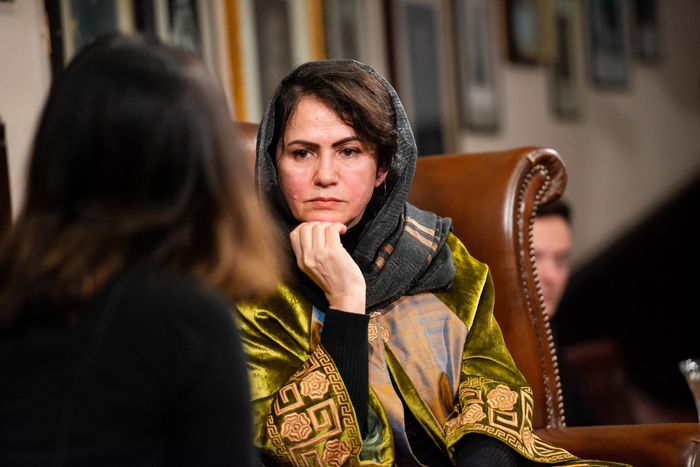Forget the Old Boys’ Club, meet the ‘New Girls’ Network’
50:50 Parliament founder Frances Scott on intersectional activism, the future of female leadership, and what Westminster can learn from primary school politics

As we sit down together following her talk at Jesus College for Week of the Woman, I cannot help but notice activist Frances Scott’s sartorial nod to her cause — her green jumper, purple scarf and white coat reflect the emblem of women’s political rights, established by the Votes for Women movement over 100 years ago.
“We are the 21st-century suffragettes!” Scott remarks of her organisation, 50:50 Parliament, which campaigns for equal gender representation across elective bodies in the UK. Currently, women make up just 31% of parliamentarians: “We want to build an inclusive and gender-balanced democracy, in which women have equal seats and equal say,” she tells me.
A former antenatal teacher and business executive, Scott credits the work of other women with inspiring her into activism, from Lucy-Anne Holmes’ ‘No More Page 3’ campaign to Mhairi Black’s support for Women Against State Pension Inequality.
Scott’s “lightbulb moment”, however, came from her nine-year-old daughter. “She was elected onto her primary school council, and she explained to me that there is always one girl and one boy from each class because it makes sense to hear equally from their voices when making decisions for the school — I thought, ‘why don’t we run the UK that way too?’”
“Research shows that women have to be asked three times before they consider putting themselves forward”
Following an online petition that gained over 50,000 signatures, Scott founded 50:50 Parliament in 2013, with the aim of attaining equal gender representation by 2030.
She details how she sought to create an “antidote to the Old Boys’ Club” by reaching out to a diverse range of women to set up group events, buddy initiatives and a platform where women who want to progress in politics could advise each other — a “New Girls’ Network”.
In the decade since, 50:50 has expanded to over 30 team members, thousands of supporters, and two well-established programmes: #SignUpToStand and #AskHerToStand.
While the former is designed to elevate the political ambitions of individual women, the latter calls upon everyone to encourage the passionate women they know to consider standing for election, “because research shows that women have to be asked three times before they consider putting themselves forward”.
For Scott, a standout moment came on 21st November 2018, the centenary of the Qualification of Women Act: “we had 300 women come to Westminster, and it was a wonderful moment when we were all in Westminster Hall calling for equal seats, 100 years after the passing of the Qualification that first allowed women to stand [for election as MPs] — that felt historic.”
More recently, 50:50 has been endorsed by Prime Minister Rishi Sunak. “I think it’s quite historic to have a Prime Minister say yes to women having equal seats,” Scott says, “but we should also be celebrating the Labour Party because they’ve done it. They don’t just say it. They actually got 50% in 2019”.
Frances explains how this year’s International Women’s Day theme, #EmbraceEquity, is central to her work — not only do women face additional barriers to men in entering politics, but “some women face higher hurdles and double discrimination due to their ethnicity, sexuality or disability”.
According to Scott, intersectionality is the solution: “we offer bespoke support and meetings for women from minority groups […] We are here for all women, trans women included. It’s about making people feel welcome, but at the same time, we don’t want to put people in silos — we want everyone to feel like we’re working together on this”.
However, she acknowledges that the recent loss of prominent female political leaders, namely Angela Merkel, Jacinda Ardern, Nicola Sturgeon, as well as the accompanying pejorative commentary, may present a setback.
“It’s a shame that women are standing down and I think we need a campaign called #AskHerToStay. It’s about showing respect and ensuring that women feel comfortable and supported in the roles that they take on and that they’re not subjected to vile misogyny, trolling and dreadful social media messages.” Scott notes that politics is “more brutal” for women both inside and outside the workplace:
“They seem to get it [online abuse] two to three times as much. It’s a real problem… but we can’t be intimidated.”
For now, Scott’s focus is the forthcoming general election: she has set a target of getting 50 more female MPs elected to Parliament. It is clear that 50:50, like the suffragette movement that inspired it, believes in ‘deeds not words’ when it comes to taking accountable action: “Right now we’re identifying the women in our network who stand a chance and trying to ensure that they’re going for winnable seats”.
With so much anticipation already surrounding the election, I am as excited as Frances Scott is to see if 50:50 Parliament are able to deliver on this ambition, and do the legacy of the women’s suffrage movement justice.
 Comment / Cambridge’s tourism risks commodifying students18 April 2025
Comment / Cambridge’s tourism risks commodifying students18 April 2025 News / Cambridge student numbers fall amid nationwide decline14 April 2025
News / Cambridge student numbers fall amid nationwide decline14 April 2025 News / Greenwich House occupiers miss deadline to respond to University legal action15 April 2025
News / Greenwich House occupiers miss deadline to respond to University legal action15 April 2025 Comment / The Cambridge workload prioritises quantity over quality 16 April 2025
Comment / The Cambridge workload prioritises quantity over quality 16 April 2025 News / Varsity ChatGPT survey17 April 2025
News / Varsity ChatGPT survey17 April 2025





